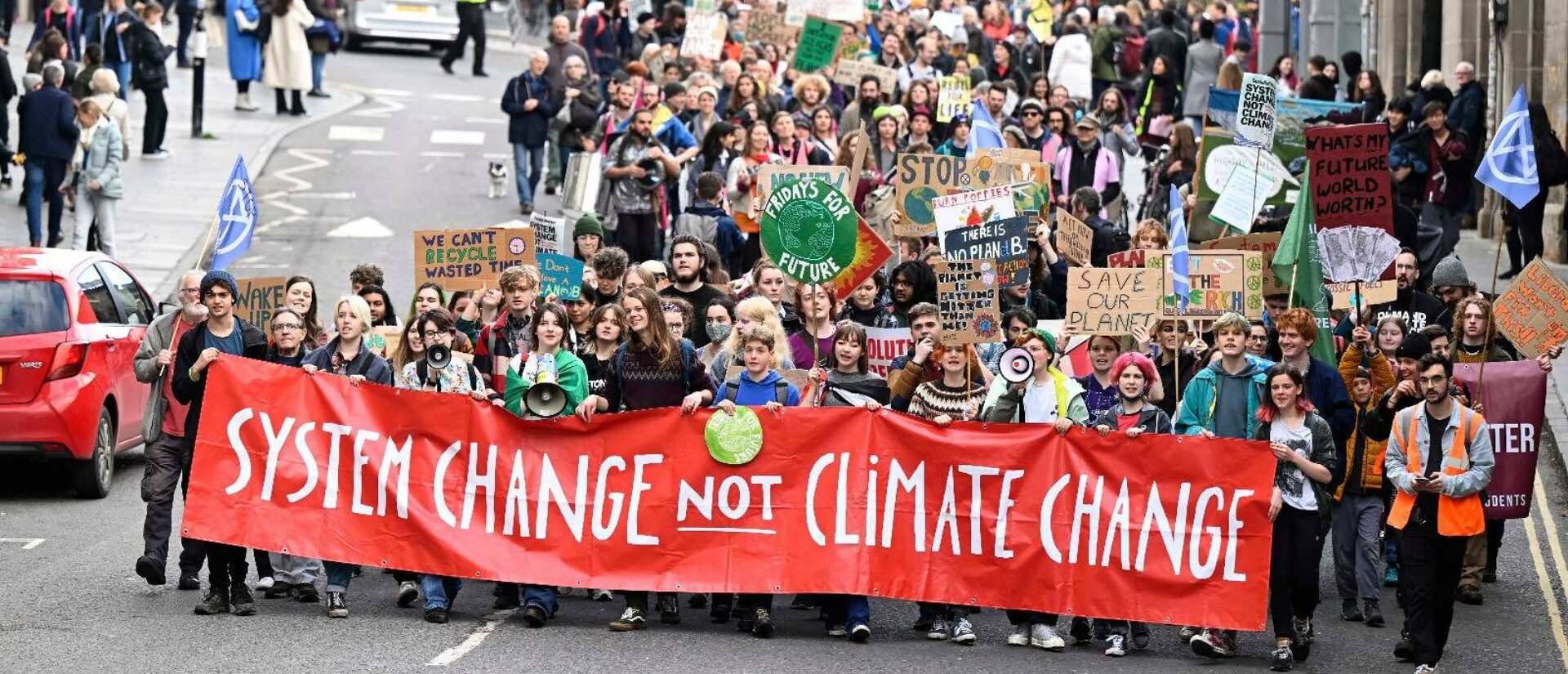
The trillion-dollar threat of climate change profiteers
How asset managers are fuelling the climate crisis with impunity


Summary
- Private investors are draining both companies and public coffers of funds needed for the transition to a sustainable energy economy.
- Asset managers are the top investors in their own shares, which creates a serious accountability problem.
- Binding regulations are needed to reorient the trillions in private finance towards sustainable investments.
At , the issue of who pays for climate change mitigation and adaptation is again one of the hottest debate topics. The Global North has thus far miserably failed to come through on even modest commitments to finance(opens in new window) the implementation of the transition(opens in new window) in the Global South and compensate for climate-related loss and damage in low-income countries that contributed little to climate change. A focus at COP28 is the gap in public (government) financing for the transition commitments. However, the private financial sector’s even greater failure to align with the – only 1 per cent(opens in new window) or less(opens in new window) of the $255 trillion in global private financial assets(opens in new window) pretends to be sustainable – is being addressed with ineffective tools touted by the financial industry.
The role of the financial industry sector is particularly insidious because in addition to investing far too little in climate-friendly projects and financing(opens in new window) fossil fuel production, private investors are draining both companies and public coffers of funds needed for the transition. Since the signing of the Paris Agreement, private investors have used their power to allow the top 1200 listed companies to pay out more than $14.7 trillion to shareholders rather than invest in the transition. COP28 needs to take concrete action to re-orient private capital. It should develop and agree on strong regulation that obliges companies to implement just transition strategies before they pay shareholders, and makes private investors such as asset managers accountable for their harmful climate impacts.
Huge profits to shareholders, not to energy transition
Big Oil is a prime example of why private investors’ role needs to be tackled. Of the staggering $357 billion in profits made by five of the world’s largest oil companies – BP, Chevron, ExxonMobil, Shell, TotalEnergies – in the seven years following the Paris Agreement (2016-2022), very little was invested in the transition to renewable energy. Instead, ExxonMobil(opens in new window) and Chevron(opens in new window) continued to invest tens of billions of dollars in long-term use of fossil fuels(opens in new window) , betting against “lower returns(opens in new window) ” from renewable energy for shareholders. BP and Shell, in turn, reduced investments and staff in renewable energy, backing their shareholders that such investments are not profitable enough. In addition, these five oil companies spent more than their profits on their shareholders: $428 billion in 2016-2022, of which $316.7 billion in .
Top profiteers
The top shareholders of the five oil companies are the world’s most dominant : BlackRock, Vanguard, and State Street Global Advisors. BlackRock managed at least 10% of Shell’s shares, and Vanguard managed 8.2% of Chevron’s shares at the end of 2022, more than any other institutional shareholder.
SOMO that between 2016-2022, by increasing their shareholdings, at least $21.4 billion in dividends flowed from the five oil companies to BlackRock, $16.7 billion to Vanguard, and $11.3 billion to State Street Global Advisors.
These top institutional shareholders have increasingly exercised their voting power against(opens in new window) a swift transition away from fossil fuels. Asset managers engage with company management behind closed doors to ensure high returns on shares for their clients, who are mostly little aware of .
Share buybacks drain trillions from the transition
In addition to paying out massive dividends, the five oil companies used part of their profits to repurchase their to please shareholders. During 2016-2022, they spent $110.9 billion on share buybacks in an attempt to increase both the value of, and return on, their shares. Share buybacks are a rapidly growing global trend. Between 2016-2022, the world’s top 1,200 companies spent $6.3 trillion on share buybacks(opens in new window) , in addition to dividends of $8.4 trillion, totalling $14.7 trillion in pay-outs to shareholders. This is money that was not spent on the transition or paid out to other stakeholders such as workers or customers. Share buybacks are often not or little taxed(opens in new window) , depriving governments of much-needed income to tackle climate change.
Masters of their profits
Soaring share values and high dividends provide an additional benefit to asset managers. It allows them to attract additional capital to, or reinvest dividends into, their investment funds, which they manage for a profitable fee. Following the Paris Agreement, BlackRock’s assets under management(opens in new window) nearly doubled to $10.1 trillion in 2021. Vanguard’s assets reached(opens in new window) an unprecedented $8.1 trillion in 2022.
The more shares they manage, the more power asset managers have to vote and engage with companies for higher dividends and share buybacks. The five fossil fuel companies have announced higher share buybacks(opens in new window) in 2023 to satisfy their shareholders at the expense of just transition investments.
BlackRock used its shareholding power to vote at more than 18,200 companies(opens in new window) worldwide in 2022. This massive clout allowed BlackRock to make $32.9 billion in 2016-2022 and pay out $15.1 billion in dividends and $12.4 billion in share buybacks to its own shareholders.
Here, a serious accountability problem emerges: the asset managers are the top institutional investors in their own shares! As of the end of 2022, BlackRock’s shares were managed by Vanguard (8.6%), BlackRock itself (at least 6.8%), and State Street Global Advisors (4.2%).
State Street Global Advisors is a subsidiary of State Street Corp. that made $ 17 billion in profits between 2016 and 2022. In 2022, its shares were managed by Vanguard (9.9%), BlackRock (at least 7.3%), and State Street Global Advisors (5,4% by its own subsidiary!). Vanguard’s private business model uses the returns on shares to reduce expenses and give an unknown amount back to Vanguard’s funds’ investors, who are considered owners of Vanguard.
Binding regulation needed – not voluntary measures or ‘de-risking’
Asset managers’ influence and decision-making structure that affect global fossil fuel emissions need an urgent transformation to avoid climate disaster. Voluntary solutions lobbied for by the have failed. False solutions such as voluntary carbon offsets(opens in new window) have proven ineffective and plagued by human rights abuse. Even the EU’s market-based approach through sustainable finance laws does not compel private financiers toward ‘green’ investments. It’s particularly absurd, thus, that COP28 policymakers are turning to another market-based solution: giving more public money to cashing-in investors to “de-risk(opens in new window) ” Paris-aligned investments with various
Instead, COP28 policymakers should agree on truly effective ways to reorient the trillions in private finance(opens in new window) using binding regulation and taxation. Regulation should require companies to implement a transition to sustainable energy that is just for workers, consumers, and communities before paying dividends to shareholders. Share buybacks should be prohibited, as they were decades ago(opens in new window) . Regulation, such as the EU’s upcoming Corporate Sustainability Due Diligence Directive(opens in new window) , must include asset managers and oblige them to avoid harmful climate impacts from their investments. Only with such binding measures can COP28 policymakers tame the trillion-dollar threat to the planet and people.
Do you need more information?
-

Myriam Vander Stichele
Senior Researcher -

Luis Scungio
Corporate Researcher


Related news
-
-
Shell’s extreme brand of disaster capitalismPosted in category:Opinion
 Rodrigo FernandezPublished on:
Rodrigo FernandezPublished on: Rodrigo Fernandez
Rodrigo Fernandez -
Shell’s AGM: back to fossil fuel business as usualPosted in category:Opinion
 Myriam Vander StichelePublished on:
Myriam Vander StichelePublished on: Myriam Vander Stichele
Myriam Vander Stichele

